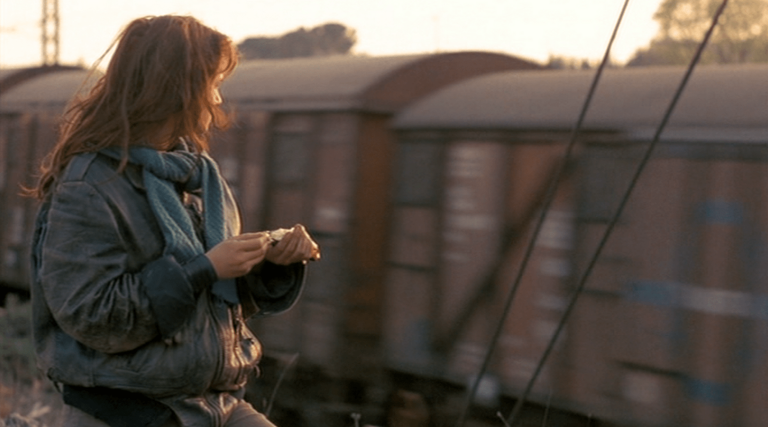
When talking about French cinema it's inevitable to talk about the Nouvelle vague, that group of filmmakers that emerged in the late fifties and early sixties in France and that influenced the work of later generations due to their freedom in both expression and film production, breaking with what was known until then. From there came names such as François Truffaut, Jean-Luc Godard and Éric Rohmer, but one woman stood out in a medium and a time in which it was not common to do so and left a memorable and exemplary work: Agnès Varda
Al hablar de cine francés es inevitable hablar de la Nouvelle vague, ese grupo de cineastas que surgió a finales de los cincuenta e inicios de los sesenta en Francia y que influyó en el trabajo de generaciones posteriores por su libertad tanto en la expresión como en la producción fílmica, rompiendo con lo conocido hasta el momento. De allí surgieron nombres como los de François Truffaut, Jean-Luc Godard y Éric Rohmer, pero una mujer destacó en un medio y una época en la que no era común hacerlo y dejó una obra memorable y ejemplar: Agnès Varda.
Varda's cinema is different, with very honest and real characters, and atypical narrative techniques, especially at the time she began making films. However, many people do not know her or give her films the place they should. Personally, although I greatly admire what I have seen of her, I recognize that I have an outstanding debt with the director of Cléo from 5 to 7 because I have only seen two of her films. That story, an afternoon in the life of Cléo, a young woman waiting for the results of some exams, was filmed in 1962 but surpasses - and by far - contemporary works without any content. Its black and white photography, performances, script and direction are among the best I've seen. So in honor of that and to repay the debt I have with Varda, I decided to watch Vagabond (Sans toit ni loi) a film released two decades after Cléo from 5 to 7 because just thinking what she could do with twenty more years of experience made me want to see it. Also, of the several films of her that I have on my to-watch list (L'une chante, l'autre pas, Jacquot de Nantes and Le bonheur, to name just three) Vagabond appeared on my MUBI screen and there I found out that it was the film that won the director the Golden Lion at the 1985 Venice Film Festival, so it seemed like a good option to see something of hers again.
El cine de Varda es diferente, con personajes muy honestos y reales, y técnicas narrativas atípicas, sobre todo en la época en que comenzó a hacer cine. Sin embargo muchas personas no la conocen ni le dan a sus películas el sitial que deberían. En lo personal, aunque admiro mucho lo que he visto de ella, reconozco que tengo una deuda pendiente con la directora de Cléo de 5 à 7 porque apenas he visto dos películas suyas. Esa historia, una tarde en la vida de Cléo, una mujer joven a la espera de los resultados de unos exámenes, fue filmada en 1962 pero supera - y por mucho - a obras contemporáneas sin nada de contenido. Su fotografía en blanco y negro, las actuaciones, el guión y la dirección son de lo mejor que he visto. Así que en honor a eso y para amortizar la deuda que tengo con Varda, decidí ver Vagabond (Sans toit ni loi) una película estrenada dos décadas después de Cléo de 5 à 7 porque de sólo pensar lo que podía hacer la directora con veinte años más de experiencia me hizo querer verla. Además, de las varias películas suyas que tengo en mi lista de pendientes (L'une chante, l'autre pas, Jacquot de Nantes y Le bonheur, por nombrar sólo tres) Vagabond apareció en mi pantalla de MUBI y allí me enteré de que fue la película que le valió a la directora el León de Oro en el Festival de Venecia de 1985, así que me pareció una buena opción para volver a ver algo suyo.
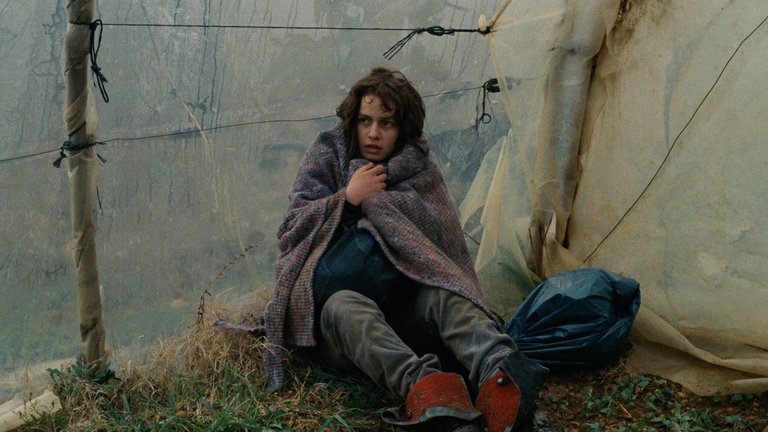
The original title in French translates No roof or law and is precisely what is told: the story of a woman - or rather, part of a woman's story - who lives outdoors and who doesn't follow the conventional rules established by the society. This is a person who lives on the margins, who is not interested in adapting to what is expected of her but wanders from one place to the other with a backpack and a tent on her back.
El título original en francés traduce Sin techo ni ley y es precisamente lo que se cuenta: la historia de una mujer - o más bien, parte de la historia de una mujer - que vive a la intemperie y que no sigue las reglas convencionales establecidas por la sociedad. Se trata de una persona que vive al margen, que no está interesada en adaptarse a lo que se espera de ella sino que vaga de un lado al otro con una mochila y una carpa a sus espaldas.
One of the best things about the film is the beginning: a farmer finds the body of a girl in a ditch. The girl is dead. In the middle of winter the nights are freezing and the cause of death was probably hypothermia. The girl is not carrying luggage at that moment and is not carrying any document, which raises thousands of questions both in the minds of the viewer and in those of the farmers and the police: who's the girl? how did she get there? was she killed? raped? Was she alone? It's then that Agnès Varda takes out her magic wand and turns a mystery into a social drama and a beautiful cinematographic product through her personal stamp and the use she makes of certain resources. For example, the script, written by the same director, intersperses flashbacks with interviews in which the different people the girl encountered in her last weeks speak. More and less friendly encounters, casual lovers, women, men, someone who barely saw her pass by, someone who put her up in his house, some shepherds, a teacher, the group of witnesses is varied and heterogeneous, but their testimonies seem to give us a incomplete idea of what happened. And I say incomplete because the truth is that only those few weeks are reconstructed, but all these people found the girl on the road, in the street, sleeping in a field and no one knows what led her there, what made her start wandering around the roads.
Una de las mejores cosas que tiene la película es el inicio: un campesino encuentra el cuerpo de una muchacha en una zanja. La chica está muerta. En pleno invierno las noches son heladas y probablemete la causa de su muerte haya sido la hipotermia. La chica no lleva equipaje en ese momento y no porta documento alguno, lo que propicia miles de preguntas tanto en la mente del espectador como en la de los campesinos y la policía, ¿quién es la chica? ¿cómo llegó ahí? ¿fue asesinada? ¿violada? ¿andaba sola? Es entonces cuando Agnès Varda saca su varita mágica y convierte un misterio en un drama social y un producto cinematográfico hermoso a través de su sello personal y del uso que hace de ciertos recursos. Por ejemplo, el guión, escrito por la misma directora, intercala flashbacks con entrevistas en las que hablan las diferentes personas con quienes la chica se topó en sus últimas semanas. Encuentros más y menos amables, amantes de ocasión, mujeres, hombres, alguien que apenas la vio pasar, alguien que la alojó en su casa, unos pastores, una profesora, el grupo de testigos es variado y heterogéneo, pero sus testimonios parecen darnos una idea incompleta de lo que ocurrió. Y digo incompleta porque la verdad es que sólo se reconstruyen esas pocas semanas, pero todas estas personas encontraron a la chica en el camino, en la calle, durmiendo en un campo y nadie sabe qué la llevó allí, qué la hizo ponerse a vagar por las carreteras.
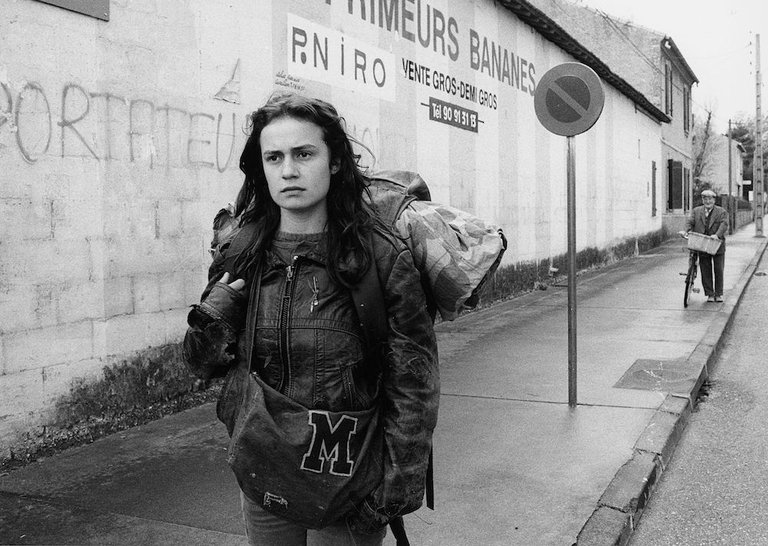
Family problems? a love failure? orphanhood? a desire to travel the world? We don't know and - in this the film is accurate - the reason why we don't know is because we are one more of the partial witnesses who saw the girl fleetingly pass by our path without getting too involved and without discovering who she was, without even asking her name. Now, it's not a reflection of an indolent or uncharitable society either: many of the witnesses provided accommodation, work and food to the girl who is not a kind and tender soul either. She has a strong character, resentful, aggressive I would say, with wild and violent attitudes. Perhaps it's necessary to be like this to survive living on the streets, or perhaps it is a way of representing society as a jungle in which one is predator and prey at the same time: sometimes we see that some take advantage of her or at least they try to do so, and other times it's the girl who uses others for her own benefit. That is why her wandering journey does not move us to the same admiration and inspiration that floods us with Christopher McCandless's experience in Into the Wild but rather leaves us with a strange, ambiguous, contradictory feeling. Sometimes she generates sympathy and compassion in us, but other times her actions disgust us, we worry about her excesses and we debate - like some of the people who meet her along the way - between the desire to help her and the security of not getting involved with someone that can be dangerous and we don't know if our solidarity or our fear is greater.
¿Conflictos familiares? ¿un fracaso amoroso? ¿la orfandad? ¿un deseo de recorrer el mundo? No lo sabemos y - en esto el film es certero - la razón por la que no lo sabemos es porque somos uno más de los testigos parciales que vio a la chica pasar fugazmente por nuestro camino sin involucrarnos demasiado y sin descubrir quién era, sin preguntar tan siquiera su nombre. Ahora bien, no se trata tampoco del reflejo de una sociedad indolente o poco caritativa: muchos de los testigos le brindaron alojo, trabajo y comida a la chica que tampoco es un alma bondadosa y tierna. Tiene un carácter fuerte, resentido, agresivo diría yo, con actitudes salvajes y violentas. Quizás sea necesario ser así para sobrevivir viviendo en la calle, o quizás es una forma de representar a la sociedad como una jungla en la que se es depredador y presa a la vez: a veces vemos que algunos se aprovechan de ella o al menos lo intentan, y otras veces es la chica la que utiliza a los demás en su propio beneficio. Es por eso que el viaje errante de ella no nos mueve a la misma admiración e inspiración que nos inunda la experiencia de Christopher McCandless en Into the Wild sino que nos deja una sensación extraña, ambigua, contradictoria. A veces nos genera simpatía y compasión, pero otras veces nos repugnan sus acciones, nos preocupan sus excesos y nos debatimos - como algunas de las personas que se la topan por el camino - entre las ganas de ayudarla y la seguridad de no involucrarnos con alguien que puede ser peligroso y no sabemos si es mayor nuestra solidaridad o nuestro miedo.

To this story that is so honest, so human and so real, we must add that it is about a woman who wanders in France in the eighties, something that defies all the conventions of the time, and that is interpreted in a masterful way by Sandrine Bonnaire (won the César for Best Actress for this role). And we also have to add the moving camera, one of my favorite aspects of this story. In several scenes the camera moves as if we were watching the scene through the window of a car and our speed was not the same as that of the girl walking on the sidewalk, which causes her to delay or pass us when we stop. This resource, in addition to other camera movements, open shots, other static shots, make the experience more immersive and different than usual. It's true that Vagabond has many cuts (to insert interviews or flashbacks), but it also has long and very dynamic sequences, in addition to a solid script and a protagonist who does not leave anyone indifferent despite not answer most of the questions most people would ask her. It's not a biography or a justification, Vagabond is the photograph of a moment in a person's life, of that last period that hides a past that will forever be hidden from us. If you don't know Agnès Varda's films, it's time to review them and this is an excellent option to do so. Have any of you seen anything by this director? I read you in the comments.
A esa historia tan honesta, tan humana y tan real, hay que agregar que se trata de una mujer que viaja errante en la Francia de los años ochenta, algo que desafía todas las convenciones de la época, y que es interpretada de manera magistral por Sandrine Bonnaire (ganó el César a Mejor actriz por este papel). Y también hay que sumar la cámara en movimiento, uno de mis aspectos favoritos de esta historia. En varias escenas la cámara se desplaza como si estuviéramos viendo la escena por la ventanilla de un auto y nuestra velocidad no fuese la misma que la de la chica que camina por la acera, eso hace que se retrase o que nos rebase cuando nos detenemos. Ese recurso además de otros movimientos de la cámara, tomas abiertas, otras estáticas, hacen que la experiencia sea más inmersiva y diferente a lo acostumbrado. Es cierto que Vagabond tiene muchos cortes (para insertar las entrevistas o los flashbacks), pero también tiene secuencias largas y muy dinámicas, además de un guión sólido y una protagonista que no deja a nadie indiferente a pesar de no responder la mayoría de las preguntas que le harían la mayoría de las personas. No se trata de una biografía o de una justificación, Vagabond es la fotografía de un momento en la vida de una persona, de ese último lapso que esconde un pasado que nos estará por siempre velado. Si no conocen el cine de Agnès Varda es momento de revisarlo y esta es una excelente opción para hacerlo, ¿alguno de ustedes ha visto algo de esta directora? Los leo en los comentarios.
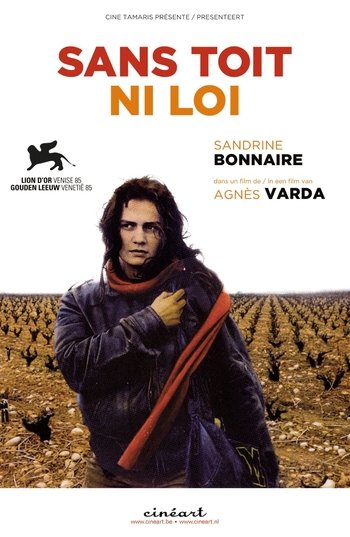
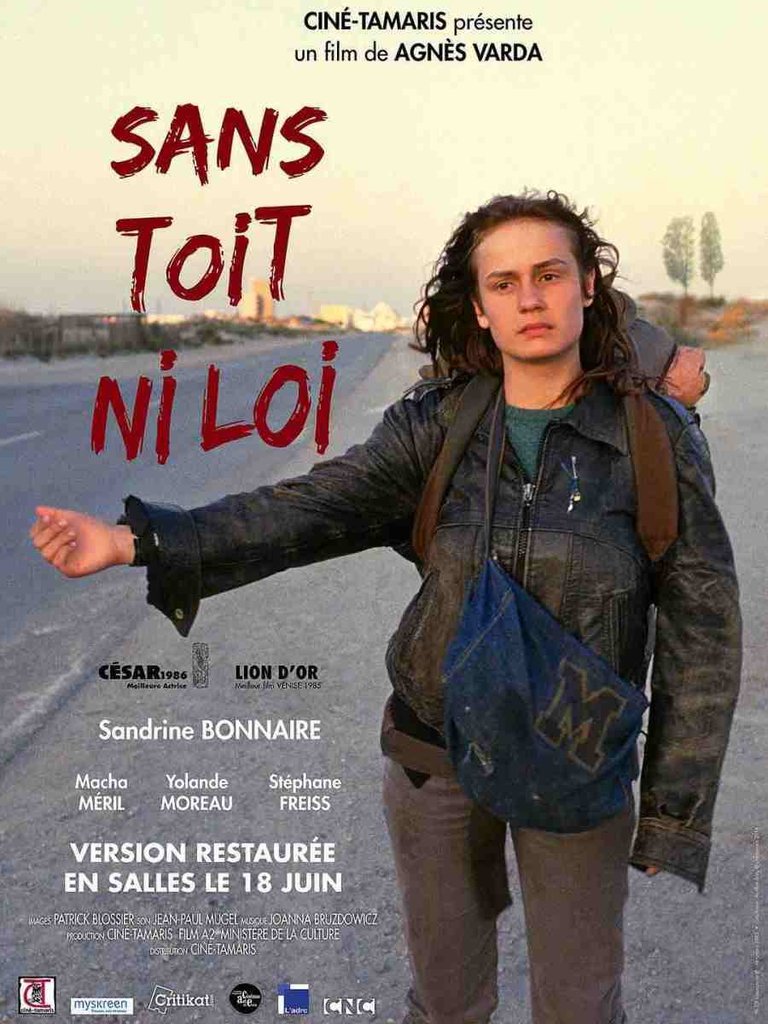
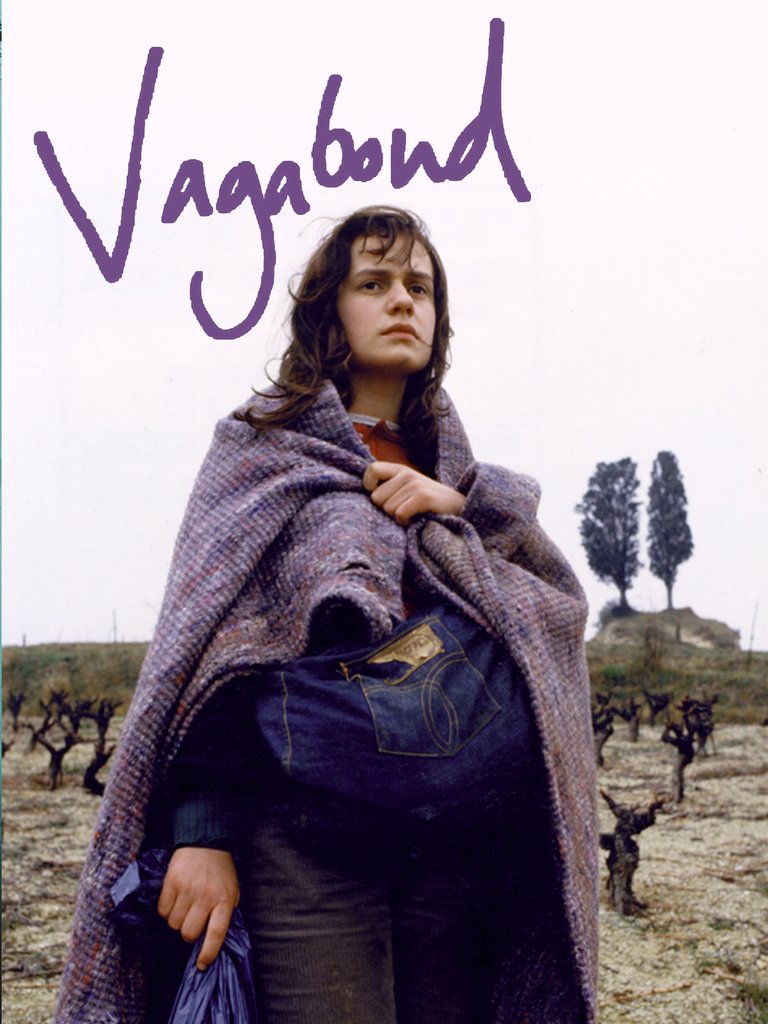
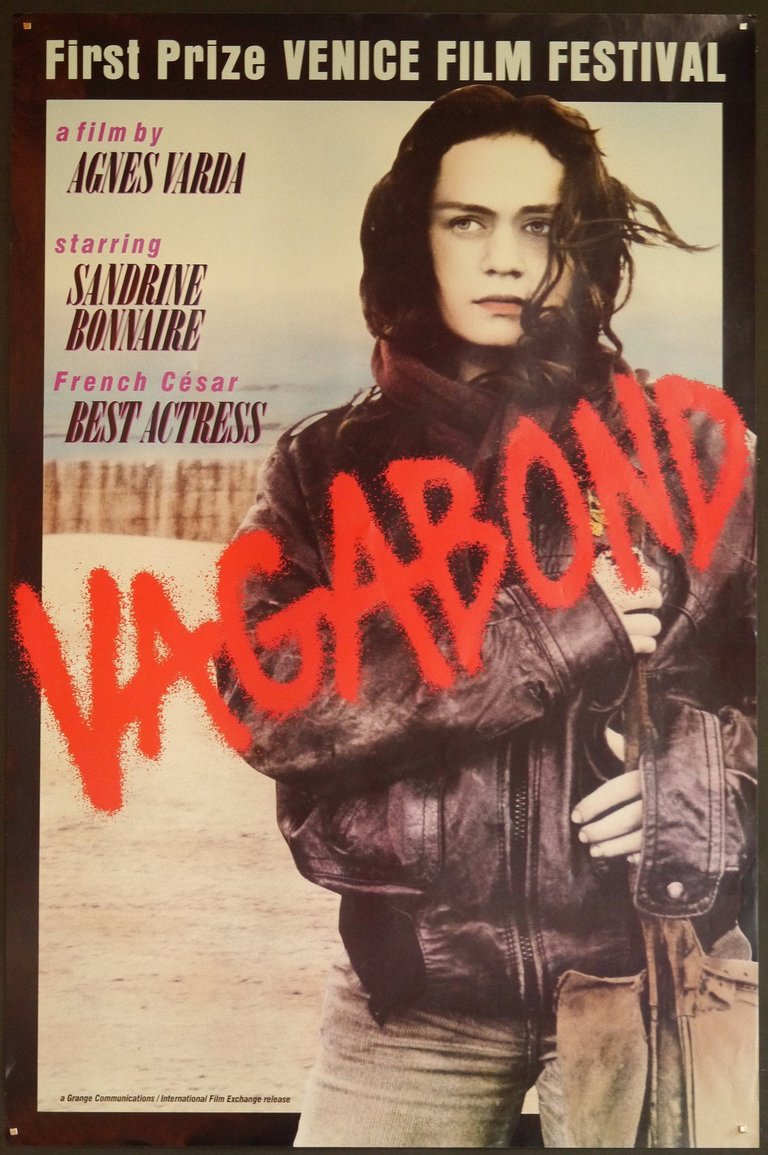


Congratulations @cristiancaicedo! You have completed the following achievement on the Hive blockchain And have been rewarded with New badge(s)
Your next target is to reach 170000 upvotes.
You can view your badges on your board and compare yourself to others in the Ranking
If you no longer want to receive notifications, reply to this comment with the word
STOPCheck out our last posts: